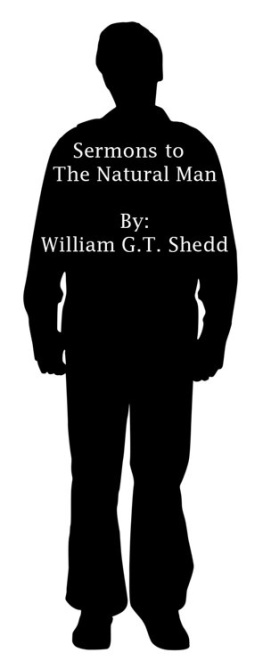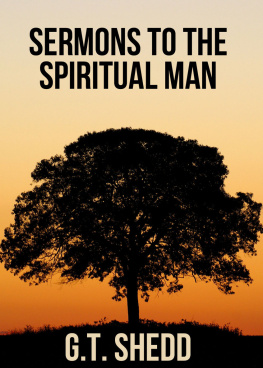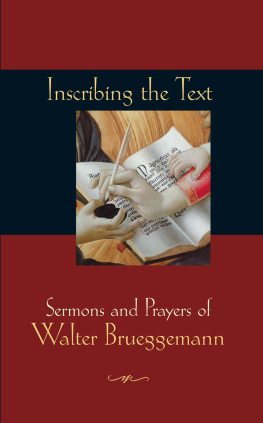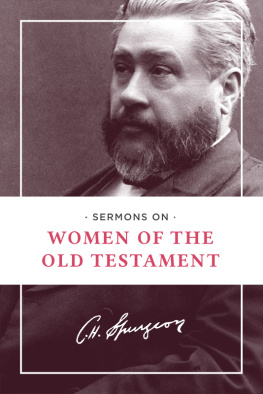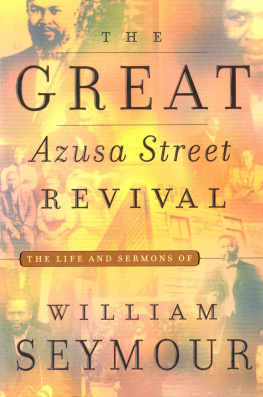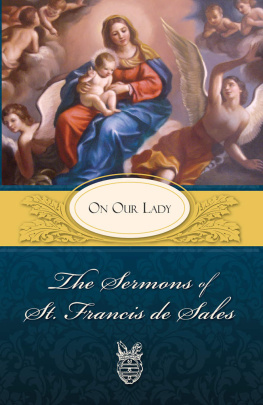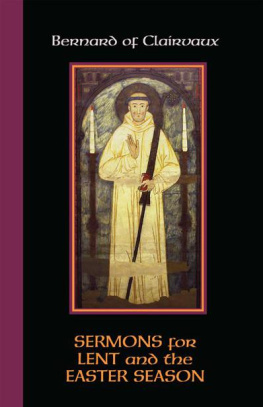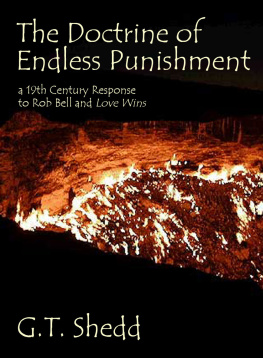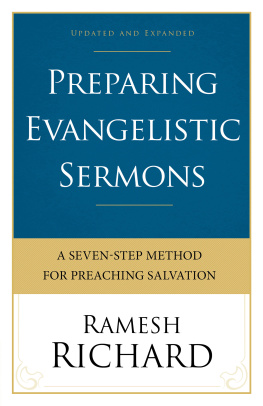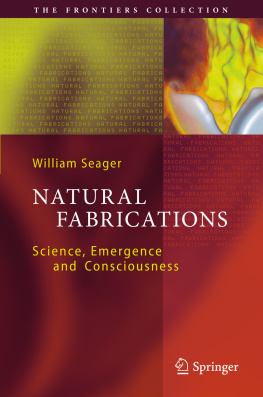William G T Shedd - Sermons to the natural man
Here you can read online William G T Shedd - Sermons to the natural man full text of the book (entire story) in english for free. Download pdf and epub, get meaning, cover and reviews about this ebook. year: 1871, publisher: New York, C. Scribner & Co, genre: Science. Description of the work, (preface) as well as reviews are available. Best literature library LitArk.com created for fans of good reading and offers a wide selection of genres:
Romance novel
Science fiction
Adventure
Detective
Science
History
Home and family
Prose
Art
Politics
Computer
Non-fiction
Religion
Business
Children
Humor
Choose a favorite category and find really read worthwhile books. Enjoy immersion in the world of imagination, feel the emotions of the characters or learn something new for yourself, make an fascinating discovery.
- Book:Sermons to the natural man
- Author:
- Publisher:New York, C. Scribner & Co
- Genre:
- Year:1871
- Rating:4 / 5
- Favourites:Add to favourites
- Your mark:
- 80
- 1
- 2
- 3
- 4
- 5
Sermons to the natural man: summary, description and annotation
We offer to read an annotation, description, summary or preface (depends on what the author of the book "Sermons to the natural man" wrote himself). If you haven't found the necessary information about the book — write in the comments, we will try to find it.
Sermons to the natural man — read online for free the complete book (whole text) full work
Below is the text of the book, divided by pages. System saving the place of the last page read, allows you to conveniently read the book "Sermons to the natural man" online for free, without having to search again every time where you left off. Put a bookmark, and you can go to the page where you finished reading at any time.
Font size:
Interval:
Bookmark:
SERMONS TO THE NATURAL MAN
BY
WILLIAM G. T. SHEDD, D. D.,
AUTHOR OF "AHISTORY OF CHRISTIAN DOCTRINE," "HOMILETICS AND PASTORAL.THEOLOGY," "DISCOURSES AND ESSAYS," "PHILOSOPHY OFHISTORY," ETC.
NEW YORK:CHARLES SCRIBNER & CO., 654 BROADWAY. 1871.
William Greenough ThayerShedd (June 21, 1820 November 17, 1894), son of the Reverend MarshallShedd and Eliza Thayer, was an American Presbyterian Theologian born in Acton,Massachusetts.
In 1835, Shedd enrolled atthe University of Vermont, and became a protg of UVM president James Marsh.Under the influence of his mentor, Shedd was deeply affected by the thought ofSamuel Taylor Coleridge and Transcendentalism. He graduated from UVM in 1839and taught school for one year, during which time he began to attend thePresbyterian church. Being called to the ministry, Shedd entered AndoverTheological Seminary in 1840 and studied under theologian Leonard Woods. Hegraduated in 1843.
After a short pastorate atBrandon, Vermont, he was successively professor of English literature at theUniversity of Vermont (18451852), professor of sacred rhetoric in AuburnTheological Seminary (18521854), professor of church history in AndoverTheological Seminary (18541862), and, after one year (18621863)as associate pastor of the Brick Church of New York City, of sacred literature(18631874) and of systematic theology (18741890) in UnionTheological Seminary. He died in New York City on November 17, 1894.
Dr. Shedd was a highCalvinist and was one of the greatest systematic theologians of the AmericanPresbyterian church. His great work was Dogmatic Theology (3 vols,18881894). He served as editor of Coleridge's Complete Works (7 vols,New York, 1894), and he also wrote:
Lectures on the Philosophy of History (1856), in whichhe applied to history the doctrine of organic evolution
Discourses and Essays (1856)
A Manual of Church History (2 vols, 1857), atranslation of Guericke
A History of Christian Doctrine (2 vols, 1863)
Homiletics and Pastoral Theology (1867)
Sermons to the Natural Man (1871)
Theological Essays (1877)
Literary Essays (1878)
Commentary on the Epistle to the Romans (1879)
Sermons to the Spiritual Man (1884)
The Doctrine of Endless Punishment (1885)
As Taken from Wikipedia, June, 2011:
http://en.wikipedia.org/wiki/William_Greenough_Thayer_Shedd
It is with a solemn feelingof responsibility that I send forth this volume of Sermons. The ordinaryemotions of authorship have little place in the experience, when one remembersthat what he says will be either a means of spiritual life, or an occasion ofspiritual death.
I believe that the substanceof these Discourses will prove to accord with God's revealed truth, in the daythat will try all truth. The title indicates their general aim and tendency.The purpose is psychological. I would, if possible, anatomize the naturalheart. It is in vain to offer the gospel unless the law has been applied withclearness and cogency. At the present day, certainly, there is far less dangerof erring in the direction of religious severity, than in the direction ofreligious indulgence. If I have not preached redemption in these sermons sofully as I have analyzed sin, it is because it is my deliberate conviction thatjust now the first and hardest work to be done by the preacher, for the naturalman, is to produce in him some sensibility upon the subject of sin. Conscienceneeds to become consciousness. There is considerable theoretical unbeliefrespecting the doctrines of the New Testament; but this is not the principaldifficulty. Theoretical skepticism is in a small minority of Christendom, andalways has been. The chief obstacle to the spread of the Christian religion isthe practical unbelief of speculative believers. "Thousayest,"says John Bunyan,"thou dost in deed and intruth believe the Scriptures. I ask, therefore, Wast thou ever killed starkdead by the law of works contained in the Scriptures? Killed by the law orletter, and made to see thy sins against it, and left in an helpless conditionby the law? For, the proper work of the law is to slay the soul, and to leaveit dead in an helpless state. For, it doth neither give the soul any comfortitself, when it comes, nor doth it show the soul where comfort is to be had;and therefore it is called the 'ministration of condemnation,' the 'ministrationof death.' For, though men may have a notion of the blessed Word of God, yetbefore they be converted, it may be truly said of them, Ye err, not knowing theScriptures, nor the power of God."
If it be thought that suchpreaching of the law can be dispensed with, by employing solely what is calledin some quarters the preaching of the gospel, I do not agree with the opinion.The benefits of Christ's redemption are pearls which must not be cast beforeswine. The gospel is not for the stupid, or for the doubter,still lessfor the scoffer. Christ's atonement is to be offered to conscious guilt, and inorder to conscious guilt there must be the application of the decalogue. JohnBaptist must prepare the way for the merciful Redeemer, by legal and closepreaching. And the merciful Redeemer Himself, in the opening of His ministry,and before He spake much concerning remission of sins, preached a sermon whichin its searching and self-revelatory character is a more alarming address tothe corrupt natural heart, than was the first edition of it delivered amidstthe lightnings of Sinai. The Sermon on the Mount is called the Sermon of theBeatitudes, and many have the impression that it is a very lovely song to thesinful soul of man. They forget that the blessing upon obedience impliesa curse upon disobedience, and that every mortal man has disobeyedthe Sermon on the Mount. "God save me,"said a thoughtfulperson who knew what is in the Sermon on the Mount, and what is in the humanheart,"God save me from the Sermon on the Mount when I am judged inthe last day." When Christ preached this discourse, He preached the law,principally. "Think not,"He says,"that I am cometo destroy the law or the prophets. I am not come to destroy, but to fulfil.For verily I say unto you, Till heaven and earth pass, one jot or one tittleshall in no wise pass from the law till all be fulfilled." John theBaptist describes his own preaching, which was confessedly severe and legal, asbeing far less searching than that of the Messiah whose near advent heannounced. "I indeed baptize you with water unto repentance: but he thatcometh after me is mightier than I, whose shoes I am not worthy to bear: heshall baptize you with the Holy Ghost and with fire; whose fan isin his hand, and he will thoroughly purge his floor, and gather hiswheat into the garner; but he will burn up the chaff withunquenchable fire."
The general burden and strainof the Discourse with which the Redeemer opened His ministry is preceptive andmandatory. Its keynote is: "Thou shalt do this," and, "Thoushalt not do that;" "Thou shalt be thus, in thine heart," and,"Thou shalt not be thus, in thine heart." So little is said in it,comparatively, concerning what are called the doctrines of grace, that it hasoften been cited to prove that the creed of the Church has been expandedunduly, and made to contain more than the Founder of Christianity reallyintended it should. The absence, for example, of any direct and specificstatement of the doctrine of Atonement, in this important section of Christ'steaching, has been instanced by the Socinian opponent as proof that thisdoctrine is not so vital as the Church has always claimed it to be. But, Christwas purposely silent respecting grace and its methods, until he had spiritualizedLaw, and made it penetrate the human consciousness like a sharp sword. Of whatuse would it have been to offer mercy, before the sense of its need had beenelicited? and how was this to be elicited, but by the solemn and authoritativeenunciation of law and justice? There are, indeed, cheering intimations, in theSermon on the Mount, respecting the Divine mercy, and so there are inconnection with the giving of the Ten Commandments. But law, rather than grace,is the main substance and burden of both. The great intention, in eachinstance, is to convince of sin, preparatory to the offer of clemency. TheDecalogue is the legal basis of the Old Dispensation, and the Sermon on theMount is the legal basis of the New. When the Redeemer, in the opening of Hisministry, had provided the apparatus of conviction, then He provided theapparatus of expiation. The Great High-Priest, like the Levitical priest whotypified Him, did not sprinkle atoning blood indiscriminately. It was to bedewonly him who felt and confessed guilt.
Next pageFont size:
Interval:
Bookmark:
Similar books «Sermons to the natural man»
Look at similar books to Sermons to the natural man. We have selected literature similar in name and meaning in the hope of providing readers with more options to find new, interesting, not yet read works.
Discussion, reviews of the book Sermons to the natural man and just readers' own opinions. Leave your comments, write what you think about the work, its meaning or the main characters. Specify what exactly you liked and what you didn't like, and why you think so.

